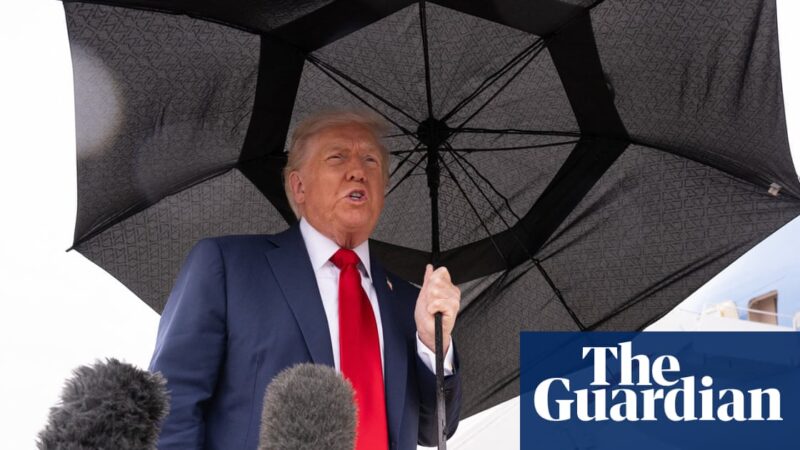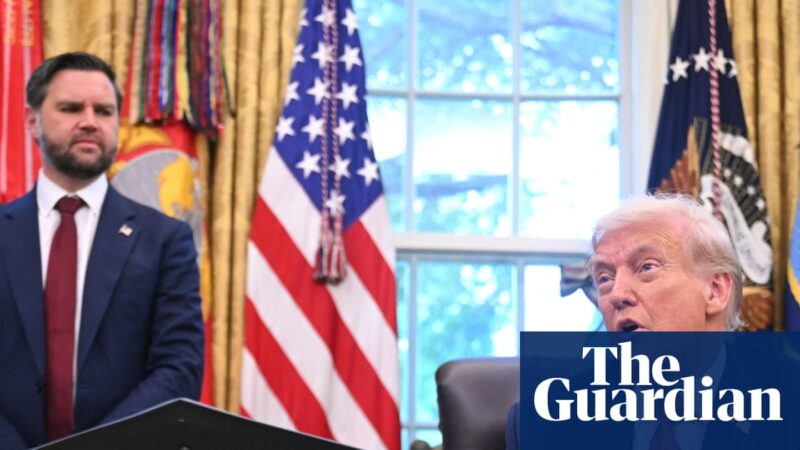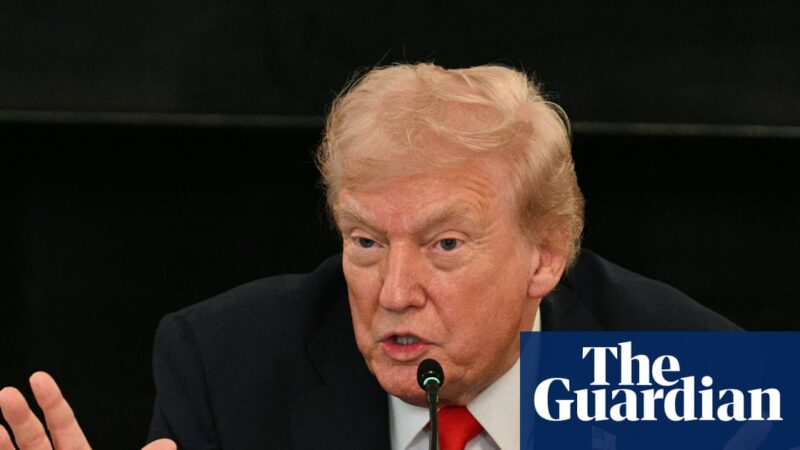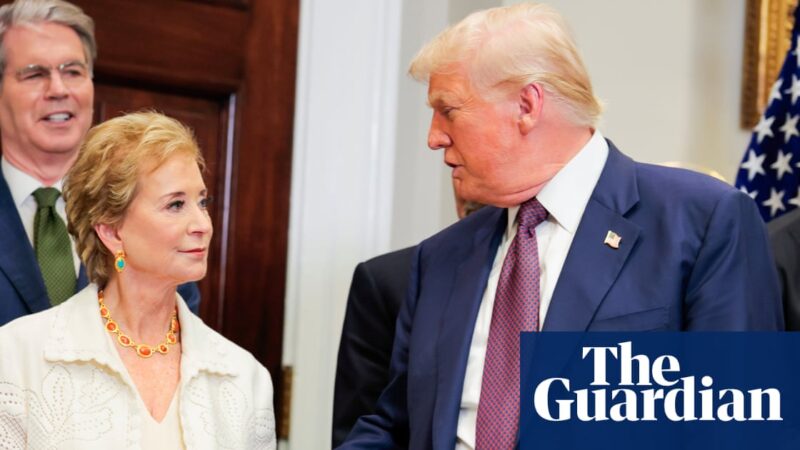Trump says ‘for the most part, there is consensus’ on next stages of Gaza ceasefire plan – live | Gaza
Key events
Scaled-up Gaza aid shipments to begin on Sunday – report
The United Nations (UN) was given the green light by Israel to begin delivering scaled-up aid into Gaza starting on Sunday, a UN official said. The official spoke on the condition of anonymity to discuss details not yet made public, reports the Associated Press.
The aid shipments are meant to address severe malnutrition and famine conditions triggered by Israeli offensives and restrictions on humanitarian help. The international criminal court is seeking the arrest of Israeli prime minister Benjamin Netanyahu and his former defence minister for allegedly using starvation as a method of war. Israeli officials deny the accusations.
Accoding to the AP, the aid will include 170,000 metric tons that have already been positioned in neighboring countries such as Jordan and Egypt as humanitarian officials awaited permission from Israeli forces to restart their work.
UN officials and Israeli authorities have engaged in a series of discussions in Jerusalem over the last 24 hours about the volume of aid humanitarian organisations can bring in and through which entry points.
UN spokesperson Stéphane Dujarric told reporters on Friday that fuel, medical supplies and other critical materials have started flowing through the Kerem Shalom crossing. UN officials want Israel to open more border crossings and provide safe movement for aid workers and civilians who are returning to parts of Gaza that were under heavy fire until only recently.
In the last several months, the UN and its partners have been able to deliver only 20% of the aid needed in the Gaza Strip, according to the UN’s under-secretary-general for humanitarian affairs and emergency relief coordinator, Tom Fletcher.
The Israeli military confirmed the start of the Gaza ceasefire on Friday, and the remaining 48 hostages, about 20 of them believed to be alive, are to be released by Monday.
Palestinians said heavy shelling in parts of Gaza earlier on Friday had mostly stopped after the military’s announcement, reports the Associated Press (AP).
Israeli prime minister Benjamin Netanyahu said in a televised statement on Friday that the next stages would see Hamas disarm and Gaza demilitarised. Netanyahu said:
If this is achieved the easy way – so be it. If not – it will be achieved the hard way.
The Israeli military has said it will continue to operate defensively from the roughly 50% of Gaza it still controls after pulling back to agreed-upon lines.
Seham Tantesh
As Abdel Fattah al-Kurdi made the long journey back to Gaza City, he found himself getting lost. Though he left the city just a few weeks ago, he could no longer recognise its streets. The buildings he had grown up in between had collapsed, their contents carpeting the roads in a mixture of torn furniture and broken concrete.
Al-Kurdi could only recognise the Netzarim checkpoint marking his entry into north Gaza by the bodies lying at its feet – those who had tried to return home too early, their faces obscured by dust after being cut down by Israeli fire.
“The city looks completely different, as if it is no longer the Gaza we once knew. In just a short time, massive destruction has spread everywhere. Almost all of the houses are destroyed, the streets blocked,” said al-Kurdi, a 40-year-old resident of Gaza City, as he returned to his home in the Sheikh Radwan neighbourhood.
Al-Kurdi was one of the thousands of people of Gaza who took advantage of the ceasefire announced on Friday to travel back to their homes in northern Gaza. Videos showed a coastal highway clogged with crowds, many on foot, making their way northwards.
For the first time since a previous ceasefire had collapsed in mid-March, fighting had stopped in Gaza. Hamas and Israel had agreed to stop fighting to prepare for the release of 48 Israeli hostages held in Gaza and nearly 2,000 Palestinian prisoners in an agreement that is meant to lead to a complete end to the two-year war.
Like most people of north Gaza, al-Kurdi was filled with anxiety as he walked north. In the days leading up to the ceasefire, Israel had been intensely bombing Gaza City as part of its campaign to occupy the city.
Al-Kurdi had no idea if his home was among the lucky few that was still standing.
Lebanon condemns overnight Israeli strikes that killed one
Lebanese president Joseph Aoun condemned Israel on Saturday for carrying out overnight strikes on civilian facilities that the health ministry said killed at least one person, Agence France-Presse (AFP) reports.
Aoun said:
Once again, southern Lebanon has been the target of a heinous Israeli aggression against civilian installations – without justification or pretext.
The seriousness of this latest attack lies in the fact that it comes after the ceasefire agreement in Gaza.
The Lebanese health ministry said an Israeli strike on the al-Msayleh area left one person dead and seven others injured.
Lebanon’s official National News Agency said Israeli warplanes conducted 10 raids targeting bulldozer and excavator yards.
The Israeli army confirmed it conducted strikes in Lebanon. In a statement, it said it had “struck and dismantled Hezbollah terrorist infrastructure in the area of southern Lebanon, where engineering machinery used to re-establish terrorist infrastructure in the area” was located.
Israel has repeatedly bombed Lebanon despite a November ceasefire, which followed more than a year of hostilities with the Iran-backed militant group that culminated in two months of open war.
Trump says ‘for the most part, there is consensus’ on next stages of Gaza ceasefire plan
US president Donald Trump has said that “for the most part, there is consensus” on how the next stages of how the Gaza ceasefire plan will work, but admitted that “some of the details … will be worked out”.
In comments made on Friday, and reported by various news outlets, Trump spoke about the remaining hostages in Gaza, adding that Hamas were gathering them “now”. He said: “they’re in some pretty rough places”.
The US president, who has been praised by Hamas and many in Israel for his role in securing a ceasefire deal, said he believes the agreement will “hold” because “they’re [Hamas and Israel] all tired of the fighting”.
Meanwhile, Trump plans to convene world leaders for a summit on Gaza during his visit to Egypt next week, Axios reported. Among those expected to participate are representatives from Germany, France, the United Kingdom, Italy, Qatar, the United Arab Emirates, Jordan, Turkey, Saudi Arabia, Pakistan and Indonesia. According to a US official, Benjamin Netanyahu will not be present.
Trump confirmed that he would meet a “lot of leaders” in Cairo on Monday to discuss the future of Gaza and it has been reported that he will also travel to Israel, where he will adress the Knesset.
More on this story in a moment, but first here are some other key developments:
-
Tens of thousands of Palestinians headed back to the heavily destroyed northern Gaza Strip on Friday as a US-brokered ceasefire came into effect in a deal that raised hopes for ending the Israel-Hamas war. The remaining 48 hostages, about 20 of them believed to be alive, are to be released by Monday.
-
Questions remain over who will govern Gaza as Israeli troops gradually pull back and whether Hamas will disarm, as called for in Trump’s ceasefire plan. Prime minister Benjamin Netanyahu, who unilaterally ended a ceasefire in March, hinted that Israel might renew its offensive if Hamas does not give up its weapons.
-
The United Nations was given the green light by Israel to begin delivering scaled-up aid into Gaza starting on Sunday, a UN official said. The official spoke on the condition of anonymity to discuss details not yet made public, reports the Associated Press. The aid will include 170,000 metric tons that have already been positioned in neighboring countries such as Jordan and Egypt as humanitarian officials awaited permission from Israeli forces to restart their work.
-
UN spokesperson Stéphane Dujarric told reporters ON Friday that fuel, medical supplies and other critical materials have started flowing through the Kerem Shalom crossing. UN officials want Israel to open more border crossings and provide safe movement for aid workers and civilians who are returning to parts of Gaza that were under heavy fire until only recently.
-
Lebanese President Joseph Aoun condemned Israel on Saturday for carrying out overnight strikes on civilian facilities that the health ministry said killed at least one person. “Once again, southern Lebanon has been the target of a heinous Israeli aggression against civilian installations – without justification or pretext,” Aoun said.
-
Israel shared a list of the Palestinian detainees that it plans to release as part of the ceasefire agreement made with Hamas. Of the 250 Palestinian prisoners, 15 will be released in East Jerusalem, 100 to the West Bank, and 135 will be deported. Initially, when Hamas officials submitted a list of proposed prisoners to be released to mediators in Egypt, they called for the release of high-profile Palestinian political figures such as Marwan Barghouti. But Netanyahu’s office confirmed it refuses to release Barghouti.





